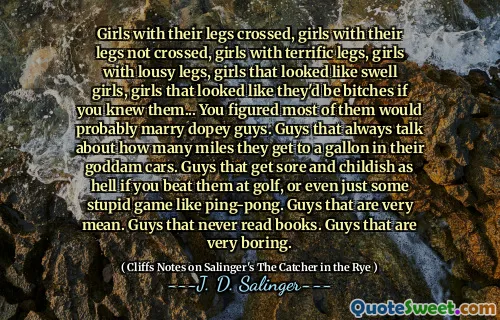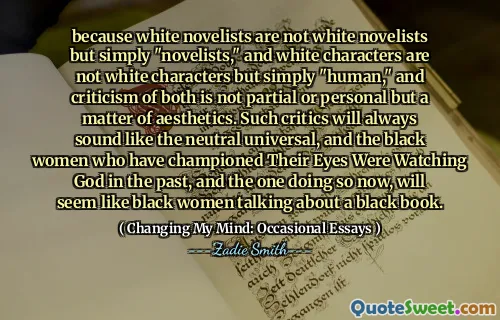
Girls with their legs crossed, girls with their legs not crossed, girls with terrific legs, girls with lousy legs, girls that looked like swell girls, girls that looked like they'd be bitches if you knew them... You figured most of them would probably marry dopey guys. Guys that always talk about how many miles they get to a gallon in their goddam cars. Guys that get sore and childish as hell if you beat them at golf, or even just some stupid game like ping-pong. Guys that are very mean. Guys that never read books. Guys that are very boring.
This quote from J.D. Salinger's The Catcher in the Rye offers a raw and somewhat cynical perspective on both women and men, reflecting the protagonist Holden Caulfield's complex and often jaded worldview. The passage categorizes girls superficially, emphasizing physical attributes and perceived personalities, reflecting a stereotypical, perhaps adolescent, way of grouping people based on appearance and limited knowledge. Likewise, the men described are portrayed with biting dismissiveness — labeled as dull, materialistic, petty, lacking intellectual curiosity, and emotionally immature.
Holden's observations convey a palpable sense of disenchantment with social norms and relationships. His descriptions are laced with judgment, suggesting a critical outlook on how individuals conform to or express traditional gender roles. The men defined by their obsession with cars and competitiveness contrast starkly with Holden’s own sensitivities and disdain for phoniness. The mention of men who "never read books" underscores an intellectual gap and a cultural emptiness he perceives in those around him, deepening his alienation.
This quote effectively encapsulates themes of alienation, superficiality, and the struggle to find genuine connection in a world that feels 'phony' to Holden. It reveals his internal conflict — navigating adolescence while being acutely critical of societal expectations and seemingly shallow interpersonal interactions. Salinger's portrayal invites readers to question these quick judgments and underlying biases, while sympathizing with a protagonist caught between innocence and disillusionment.




